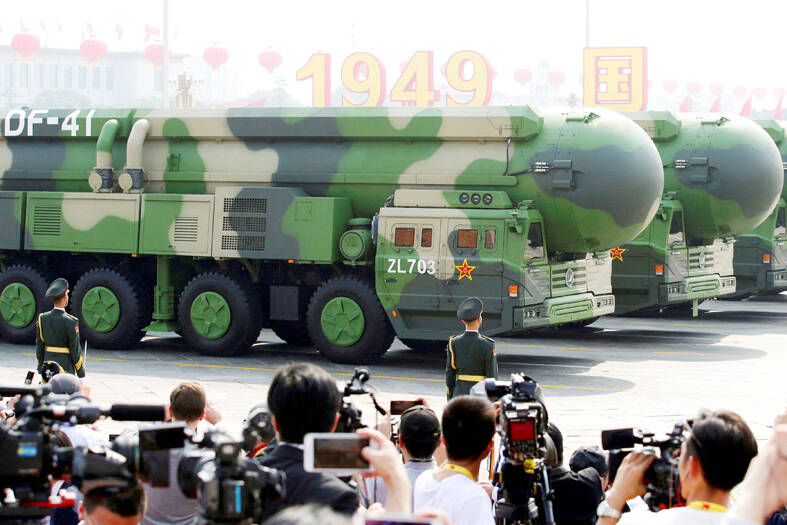China said it test-launched an intercontinental ballistic missile (ICBM) yesterday, firing it into the Pacific Ocean in its first such exercise in decades.
The launch sparked protests from countries in the region, with Japan saying it had not been given advance notice and expressing “serious concern” about Beijing’s military buildup.
In Taipei, the Ministry of National Defense (MND) said it detected “intensive” Chinese missile firing and other drills, but did not give details.

Photo: Reuters
Beijing has stepped up its nuclear development and boosted defence spending over the past few years, with the Pentagon warning in October last year that China was developing its arsenal more quickly than the US had anticipated.
China held more than 500 operational nuclear warheads as of May last year and is likely to have more than 1,000 by 2030, it said.
The Chinese People’s Liberation Army Rocket Force “launched an ICBM ... carrying a dummy warhead to the high seas in the Pacific Ocean at 8:44 on Sept. 25, and the missile fell into expected sea areas,” the Chinese Ministry of National Defense said in a statement.
An analyst said such tests were rare.
“This is extremely unusual and likely the first time in decades that we’ve seen a test like this,” Carnegie Endowment for International Peace Stanton senior fellow Ankit Panda said.
The test “likely speaks to China’s ongoing nuclear modernization manifesting in new requirements for testing,” he added.
Japan said it was given “no notice from the Chinese side in advance,” with a government spokesman adding that Beijing’s military buildup was a “serious concern.”
Australia said it was seeking “an explanation” over the launch.
New Zealand also said the launch of the missile, which landed in the South Pacific, was “an unwelcome and concerning development.”
The MND said it had detected 23 Chinese military aircraft, including J-16 fighters and drones, operating around Taiwan carrying out long-range missions to the southeast and east of the nation.
Taiwan has dispatched its own air and naval forces to keep watch, it said.
Additional reporting by Reuters

‘FORM OF PROTEST’: The German Institute Taipei said it was ‘shocked’ to see Nazi symbolism used in connection with political aims as it condemned the incident Sung Chien-liang (宋建樑), who led efforts to recall Democratic Progressive Party (DPP) Legislator Lee Kun-cheng (李坤城), was released on bail of NT$80,000 yesterday amid an outcry over a Nazi armband he wore to questioning the night before. Sung arrived at the New Taipei City District Prosecutors’ Office for questioning in a recall petition forgery case on Tuesday night wearing a red armband bearing a swastika, carrying a copy of Adolf Hitler’s Mein Kampf and giving a Nazi salute. Sung left the building at 1:15am without the armband and apparently covering the book with a coat. This is a serious international scandal and Chinese

PERSONAL DATA: The implicated KMT members allegedly compiled their petitions by copying names from party lists without the consent of the people concerned Judicial authorities searched six locations yesterday and questioned six people, including one elderly Chinese Nationalist Party (KMT) member and five KMT Youth League associates, about alleged signature forgery and fraud relating to their recall efforts against two Democratic Progressive Party (DPP) legislators. After launching a probe into alleged signature forgery and related fraud in the KMT’s recall effort, prosecutors received a number of complaints, including about one petition that had 1,748 signatures of voters whose family members said they had already passed away, and also voters who said they did not approve the use of their name, Taipei Deputy Chief Prosecutor

A US Marine Corps regiment equipped with Naval Strike Missiles (NSM) is set to participate in the upcoming Balikatan 25 exercise in the Luzon Strait, marking the system’s first-ever deployment in the Philippines. US and Philippine officials have separately confirmed that the Navy Marine Expeditionary Ship Interdiction System (NMESIS) — the mobile launch platform for the Naval Strike Missile — would take part in the joint exercise. The missiles are being deployed to “a strategic first island chain chokepoint” in the waters between Taiwan proper and the Philippines, US-based Naval News reported. “The Luzon Strait and Bashi Channel represent a critical access

COUNTERINTELLIGENCE TRAINING: The ministry said 87.5 percent of the apprehended Chinese agents were reported by service members they tried to lure into becoming spies Taiwanese organized crime, illegal money lenders, temples and civic groups are complicit in Beijing’s infiltration of the armed forces, the Ministry of National Defense (MND) said in a report yesterday. Retired service members who had been turned to Beijing’s cause mainly relied on those channels to infiltrate the Taiwanese military, according to the report to be submitted to lawmakers ahead of tomorrow’s hearing on Chinese espionage in the military. Chinese intelligence typically used blackmail, Internet-based communications, bribery or debts to loan sharks to leverage active service personnel to do its bidding, it said. China’s main goals are to collect intelligence, and develop a